Workplace inclusivity: Voices from the field
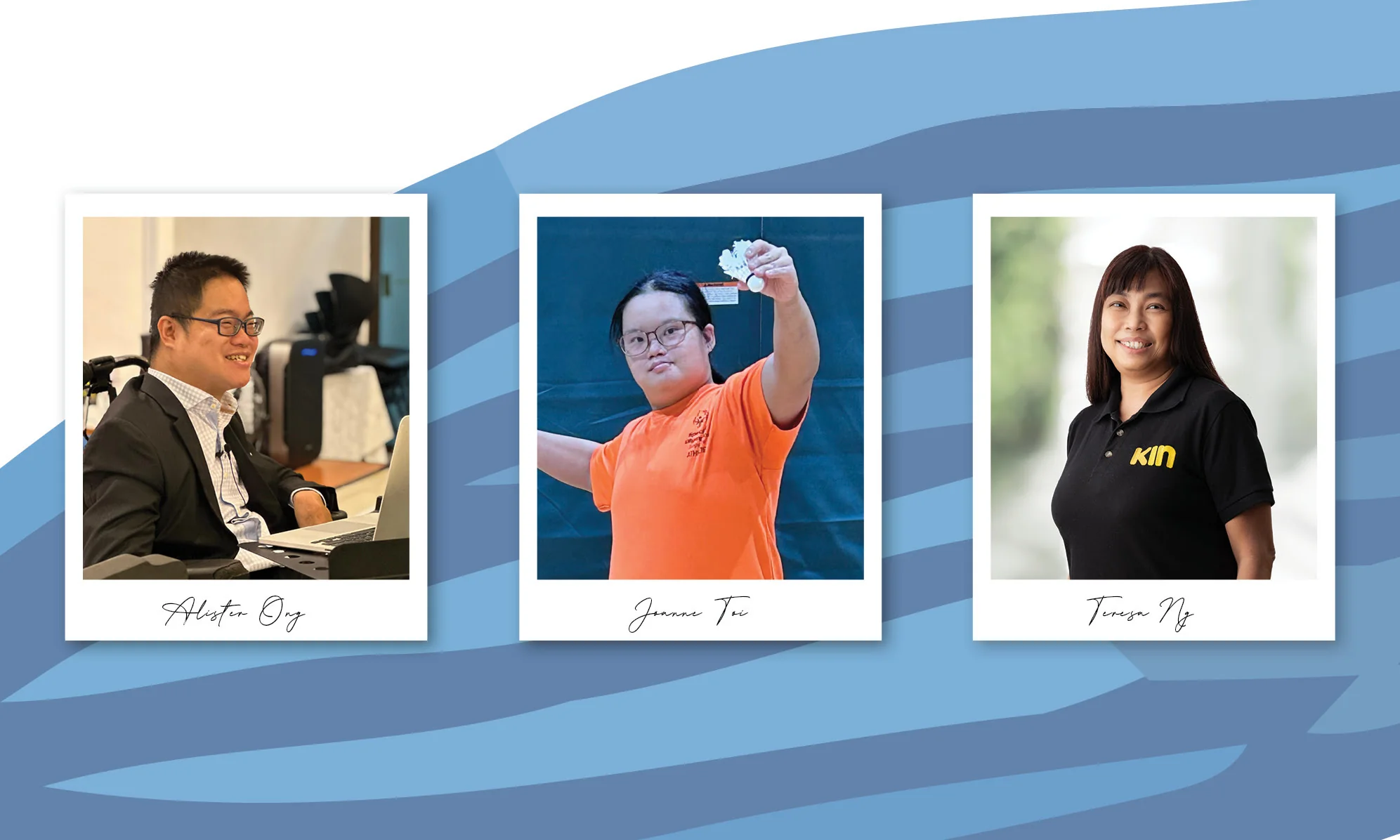
Workplace inclusivity for persons with disabilities (PWDs) has made some strides in Singapore, though there is still a long way to go. Koinonia Inclusion Network (KIN) interviewed three differently abled Christians, all working and thriving in their respective vocations. They share about their workplaces and how their faith has guided them.
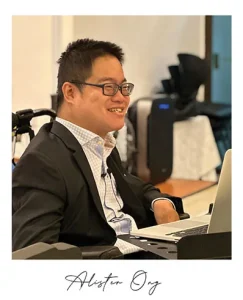
Alister Ong, in his 30s, was born with cerebral palsy due to oxygen deprivation at birth, impairing his hands and legs. Despite his challenges, Alister is active and mobile, often seen attending meetings and events in a motorised wheelchair. He serves as the Vice-Chairperson of the Purple Parade and is a recipient of the Goh Chok Tong Enable Awards. Currently, Alister is the Diversity, Equity and Inclusion Client Solutions Lead at Michael Page (a professional recruitment consultancy). He also serves as Deputy Chairman of KIN and as a missions ministry leader at City Harvest Church.
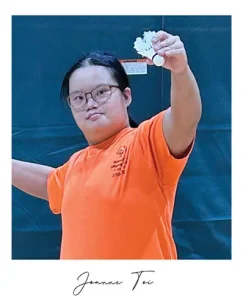
Joanne Toi, in her late 20s, has worked as a packer at a floral retail company since graduating from an APSN school. Born with Down Syndrome and enlarged tonsils that initially muffled her speech, Joanne has overcome these challenges with extensive training from her mother, Mrs Felicia Toi. She excelled in swimming, earning gold and silver medals at the Special Olympics at age 12. Currently, she trains with the Special Olympics badminton team. Joanne and her family worship at Wesley Methodist Church. Joanne and Felicia both contributed to this interview.
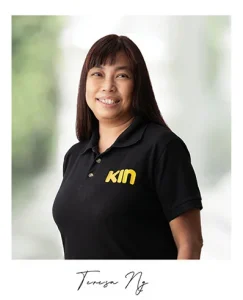
Teresa Ng, in her 50s, has worked for eight years as a guide and facilitator at a social enterprise and has been a consultant with KIN for two years. Diagnosed with optic atrophy at age 10, an eye condition that degenerates the optic nerves, Teresa has dedicated her life to raising awareness about her condition and advocating for the inclusion of persons with disabilities in church. She is an active member of Covenant Presbyterian Church.
Share your journey of how you landed at your current company and role.
Alister:
My career began at Singtel, where I greatly appreciated their efforts to make the workplace accessible. They not only widened the entry gate for my wheelchair but also automated the doors on my floor and adapted the card access readers to
sense the RFID tag I wear, which allows me to move around effortlessly.
As my career progressed, I aimed to have a more direct impact on individuals with disabilities. This opportunity arose at Michael Page when they were looking to form a new team led by then-global CEO Steve Ingham, who, after becoming a permanent wheelchair user due to a near- fatal accident, was deeply committed to advancing equal opportunities for people with disabilities.
Currently, I lead this team, focusing on securing suitable job placements for candidates with disabilities. We support both the new hires and their employers post-placement, ensuring a seamless transition and integration into their new roles.
Felicia (Joanne’s words in italics):
APSN Delta offered Joanne two routes to learn from—hospitality and horticulture. The hospitality work environment was not suitable for her. When Joanne graduated, MINDS helped to secure her employment at a local flora and horticulture company.
I just want horticulture only. I’m the only packer. I pack fertilisers and pebbles.
Presently, Joanne manages the packing of bulk items. Her responsibilities also include arranging potted plants, cleaning flowerpots and maintaining their cleanliness. On weekends, she assists in the retail section, helping customers as needed.
Teresa:
I started my career as a full-time tutor, a role I held for over 20 years. I made a career switch and joined a media company as a media representative, a role which required extensive travel to manage exhibitions overseas. Since my two boys were young at the time, I resigned after a year.
As my children grew older, I re-entered the job market. Remarkably, opportunities quickly emerged. The first position I secured was with my current organisation, which I discovered by calling the Singapore Association for the Visually Handicapped hotline. Later, I began part-time work as a sensory panellist for a perfumery, and a few years after, an opportunity at KIN also presented itself.
I didn’t face too many challenges during my job search, likely because I have a clear understanding of what I want and my capabilities, particularly in roles that involve teaching and facilitating.
What kind of challenges do you face daily in your work? How did you overcome them?
Alister:
A significant challenge in my work is managing the unconscious bias of colleagues. People often don’t realise they harbour these biases, and in our Asian context, colleagues may not openly ask about their doubts. For example, some wonder why I have a room for calls— because I use the hands-free speaker mode as it’s hard for me to hold a phone to my ears. Or why I wear shorts instead of formal pants—simply because they make restroom visits easier for me.
Being open, real and vulnerable helps others understand my context better, which may encourage them to show greater empathy and compassion.
Felicia:
Joanne has challenges with understanding instructions. When she doesn’t understand, she does the job wrongly. This causes time and resources to be wasted as repacking is required. I often advise her to repeat instructions back to her supervisors to ensure she’s understood correctly. When assigned new tasks, Joanne requires more time to learn the procedures. I often help by breaking down the steps, enabling her to perform better.
Teresa:
One of my biggest challenges is the use of technology. Preparing and presenting PowerPoint slides are particularly difficult. Thankfully, my colleagues at KIN assist with the slides, allowing me to focus on speaking and imparting knowledge during workshops.
In another organisation that I work in, many of them are fully blind, while I am partially blind. Because of this, I sometimes receive less support. More attention naturally goes to those with no sight. However this results in a higher risk of falls, which happened to me recently, as I lacked a shoulder to lean on when walking. Communicating about each other’s needs can help to avoid such mishaps from happening unnecessarily, creating a safer workplace for everyone.
What key beliefs and promises guide your life, and how have they shaped your perspective towards work?
Alister:
The Bible verse Jeremiah 29:11 (NKJV), “For I know the thoughts that I think toward you, says the Lord, thoughts of peace and not of evil, to give you a future and a hope.” I remembered thinking, “God, is there even a future and hope for someone like me?” Yes, there is! He has been faithful to remind me of this time and again.
Psalm 139:14 is another; we are “fearfully and wonderfully made”. According to the world’s perspective, how am I wonderfully made? But I know that I am created in God’s image. Therefore, my life is not a mistake. It will not go to waste.
These verses have transformed my perspective from feeling burdensome to becoming a blessing. Instead of just receiving, I can also give. My workplace is my mission field where I use my ability to connect with others, advocate for the voiceless, and bring hope to the hopeless.
Joanne:
Love, joy, peace. The fruit of the spirit. Patience to the customers. Love my family and neighbours.
Teresa:
Years ago, God gave me a vision that strengthens me to this day. I found myself in a farm where there was a cave nearby. Standing next to the cave was Jesus, who was holding a lamp. As I walked towards him, he beckoned me to go into the cave. Although it was pitch dark inside, I took the lamp from him and stepped forward in faith. As I progressed, I saw a small distant light that gradually became a beam, guiding my way. Eventually, I emerged from the cave to find Jesus waiting, and it felt like stepping into a brand new world. I felt great relief.
This vision teaches me about the importance of having faith. Life may have its dark periods, but with faith, I’m reminded that I am never truly alone. Jesus, the light, is always with me. Whenever I feel excluded or isolated, I reassure myself with this truth and find the strength to overcome any challenge.
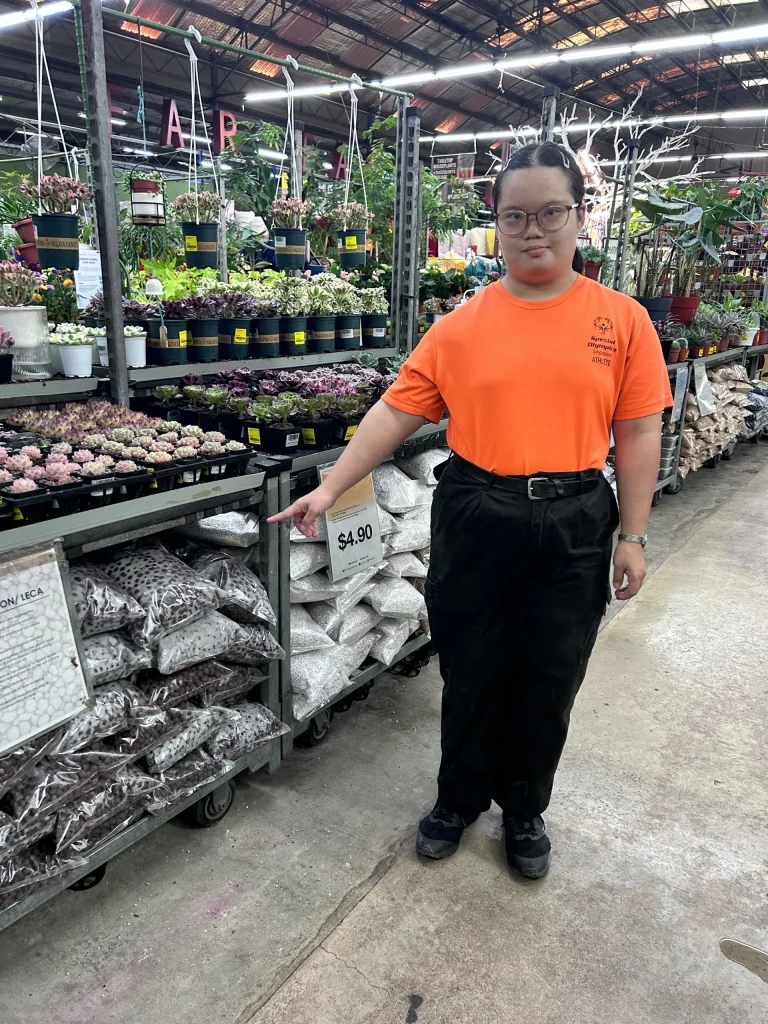
Joanne Toi is the packing manager at
a flora and horticulture company
How has your current company supported you in your growth and work challenges?
Alister:
During my hiring interview at Michael Page, I proposed redesigning some job responsibilities to leverage my strengths. Specifically, I suggested focusing on roles that require convincing, influencing and bringing people together, as my ability to speak effectively utilises the strengths and skillsets God has given me. Thankfully, they agreed and adapted my role. Now, I lead a team with diverse strengths, allowing us to complement each other effectively.
Felicia (Joanne’s words in italics):
I’m delighted that Joanne’s bosses and colleagues treat her just like any other employee, allowing her to experience real working life. Going to work daily has made her a responsible individual with a sense of purpose.
Because I’m packing manager.
This designation has greatly boosted her self-esteem. She is proud of this role and eagerly looks forward to her workdays, where she can meet and talk with her colleagues.
I enjoy talking to customers. When they ask me something I don’t know, I’ll ask my supervisors. When I cannot manage my task, I’ll ask my staff to help me. They are always willing to lend me a hand.
Joanne affectionately refers to her male colleagues as her staff. They assist her with physically demanding tasks, such as retrieving heavy boxes from shelves and loading them onto lorries.
Teresa:
I am deeply grateful for the training provided by my current organisation, which has significantly enhanced my public speaking, facilitation and storytelling skills.
Working at KIN has also deeply enriched my spiritual growth and theological understanding of disability. Initially, my grasp of the Bible was quite superficial, but KIN’s emphasis on being doctrinally sound in our teaching has pushed me to delve deeper into Scripture. I appreciate the thorough training that helps us understand God’s word better and the supportive environment that allows me to explore and clarify my doubts.
What advice would you give to a person with a disability seeking employment or facing challenges at work?
Alister:
Hold fast to God’s promises. Whenever we face setbacks at work, we should spend
time seeking him and letting his Word renew our minds. With God’s strength, we gain the confidence to try again and start anew. He will make a way for us.
As Christians, we are different because we have God within us. We can view challenges as opportunities to develop the fruits of the Spirit. For instance, during job cuts when everyone is stressed and anxious, as children of God, we can embody the peace that surpasses all understanding. This influences how we respond and interact, allowing us to shine for Jesus.
Felicia (Joanne’s words in italics):
Admit our mistakes.
Joanne has the humility to admit her mistakes when she does perform her tasks well. She desires to improve herself and feel more confident of her contribution to the company.
Teresa:
Self-awareness is crucial. Understand your capabilities and limitations. For instance, when interviewed by KIN for the role of Consultant, I told them in all honesty, “You can let me run a workshop, but please don’t make me do administrative work; I’m only good at talking.” Thankfully, they understood my needs and were supportive of me.
Also, never give up on your job search. Continuously upskill yourself by taking courses and learning new things. Maintaining a willingness to learn ensures your growth. Most importantly, pray for wisdom. Seek advice from a mentor or confide in a close friend to feel supported. Be mindful not to isolate yourself.
How can employers and employees make the workplace a more inclusive one?
Alister:
An inclusive workplace values everyone as individuals, celebrating each person based on their strengths and gifts. Our worth should not be measured by outcomes, intellect, or job grade. It’s also crucial to create an environment where meaningful conversations can take place about a person’s needs and context, especially for those with disabilities, while respecting their privacy. This approach minimises assumptions and enhances understanding.
Felicia (Joanne’s words in italics):
Good friends. Talk to me.
Joanne appreciates when her bosses and colleagues are friendly and take the initiative to engage with her. For workplaces to be inclusive, especially for those with intellectual disabilities, supervisors must demonstrate patience and clear communication.
Teresa:
We should consider the needs of others alongside our own. For instance, while I might ask sighted colleagues to accommodate my needs, it’s important to consider theirs as well. Everyone has limitations that others can help address.
Photos courtesy of Alister Ong, Felicia Toi and Teresa Ng
“This article was first published in the July 2024 issue of Methodist Message and is reproduced with permission.”